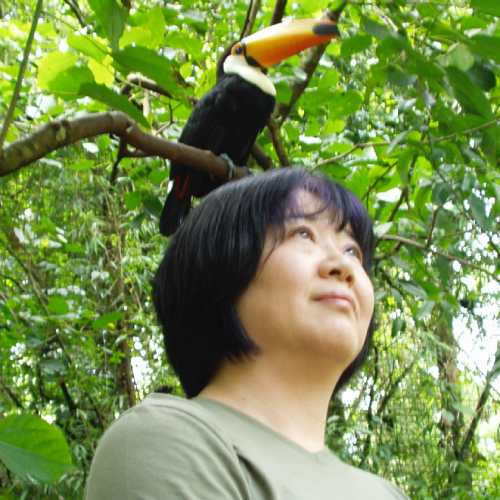
Manami Tanaka
Japan, Bradeion Institute of Medical Sciences, JapanTitle : Biomedicine in 21 st century by Huaier: The practical health maintenance and successful recovery from cancer
Abstract
The time has come to reconsider the strategy of health maintenance and compensation of genetic damage from ageing and stresses in a course of life. Huaier therapy provides a realistic solution to the disease like cancer, which requires to overcome various problems problems during the long process toward the complete recovery. Anti-cancer effects of Huaier (Trametes robiniophila murr) are based on its clinical significance on cancer patients, and the researches were performed on the hypothesis that mono-targeting medicine such as conventional chemotherapy is not enough to cope with the disease derived from multi-dimentional factors.
Anti-cancer effects of Huaier were 1) cancer specific cell death and elimination of resulted debris, 2) rescue of disruption in multi-functional, integrated signaling pathways, and 3) transctiption regulation of tissue regeneration by promotion of normal cell specification in induced pluripotent stem (iPS) / embryonic stem (ES) cells. For this purpose, Huaier initiates normal integration of inter/intra-cellular multi-signal trafficking, which requires striking qualitative and quantitative genetic/genomic alterations.
Since 2017 to present, we have performed systematic MEGA-DATA (TELA-bite genetic information) transcriptome analysis by genome-scale mRNA and small non-coding RNA sequencing using patients’ specimens (clinical research), before and after the Huaier administration. The quantitative (> 7.4 GB RNA sequencing of each sample) and qualitative (mean number=27.411 transcriptomes) analysis clearly exhibits drastic alterations amongst genome-wide expressed genes related to all the physiological systems and pathways. In 2017, the rescue of Hippo signaling pathway, a typical model pathway integrating multiple signaling cascaes,were successfully proved as expected, the modulation of the cell fate was also observed in the immune system, i.e., in the process of hematopoietic cell lineage, reaction to virus infection, and related to many signaling pathways for cell growth and proliferation.
In contrast, surprising enhancement and compensation of gene function were observed almost all known transcriptional factor responsible for the correction of transcriptional misregulation. These altered transcriptional control together with the upregulation of gene function of p53, p16, Rb, PTEN, K-Ras, and c-myc, resulted in the significant changes in regulation of cell proliferation and increased normal cell survival, and more importantly, altered cell fate shifted to embryogenesis. In order to recover from cancer, such a drastic integration of altered signaling molecules and the control on signal trafficking is required. Surprisingly, strong embryogenesis followed by natural selection of iPS cells with stable growth was observed in one case of lung cancer (late stage 4). The patient has been long treated with conventional anti-cancer chemotherapy (= significant shut down of gene function).
In addition, Huaier has its potential to re-adjust the functional disruption in many kinds of signaling network and its links to the impaired signal transfer inter/intra neurons, and in the neurodegenerative diseases such as Parkinson’s disease. In total, these effects result in successful maintenance of homeostasis for a long-range of life.
Biography
Name: Dr. Manami Tanaka, M.D., Ph.D.
Vice Preident: Bradeion Institute of Medical Sciences, Co. Ltd.
Nationality: Japan
Birth Place: Hokkaido, Japan
Birth Date: 16 February, 1958
Education
M D 1982 Tokyo Medical and Dental University (Medical School), Japan
PhD 1986 Tokyo University (Pathology), Japan
Positions held
2011-present: Vice President; Bradeion Institute of Medical Sciences, Co. Ltd.
2006-2013: Adjunctive Professor of Hirosaki University School of Medicine
2004-present: Visiting Professor of Tokai University School of Medicine
1997-2011: Head of Bradeion Project, National Agency of Advanced Science and Technology, attached to Ministry of International Trade and Industry
1987-1997: Assistant Professor, University of Tsukuba, School of Medicine
1986-1987: Research Assistant, University of Tokyo, Institute of Medical Science
International
1987-1990: Pos. Doc. At Dartmouth Medical School, Department of Microbiology
1991-1993: Visiting Assistant Professor, State University of New York at Baffalo, Department of Microbiology
1993-1995: Head of WHO project (Parasite Genome: schistosomes)
1992-1995: Head of International collaboration for parasite genome project with British Museum (Natural History), FIOCRUZ (Sao Paulo), and TIGR (USA).
Areas of Interest
1. Oncology
2. Medical Pathology
3. Genetic engineering, Genome analysis (chromosomal level)
4. Biodiversity
5. Microbiology and parasitology
Awards:
Halasz Award,17th International Symposium on Microscale Separations and Capillary Electrophoresis (HPCE 2004)?Salzburg, Austria. February, 8-12, 2004.

